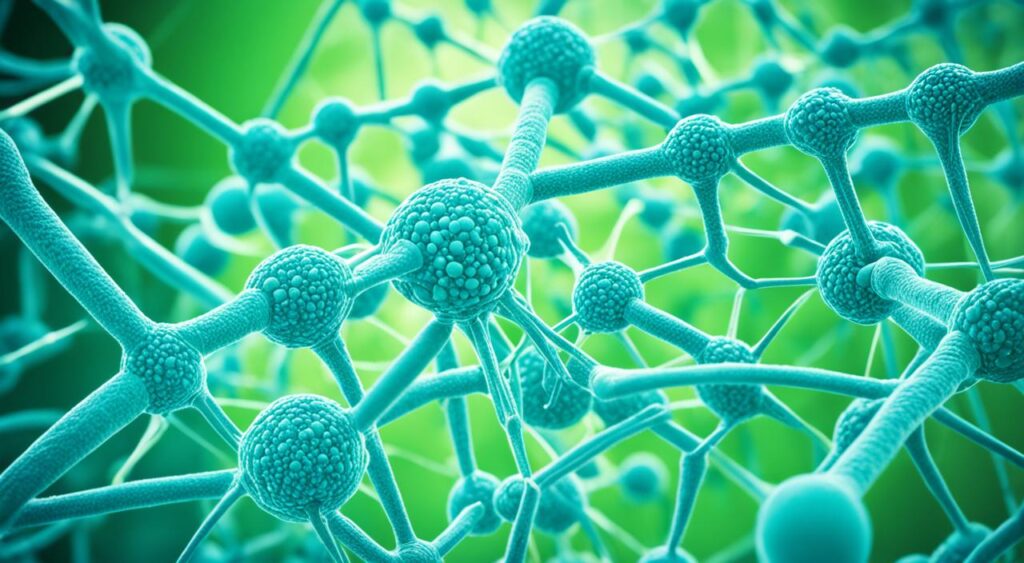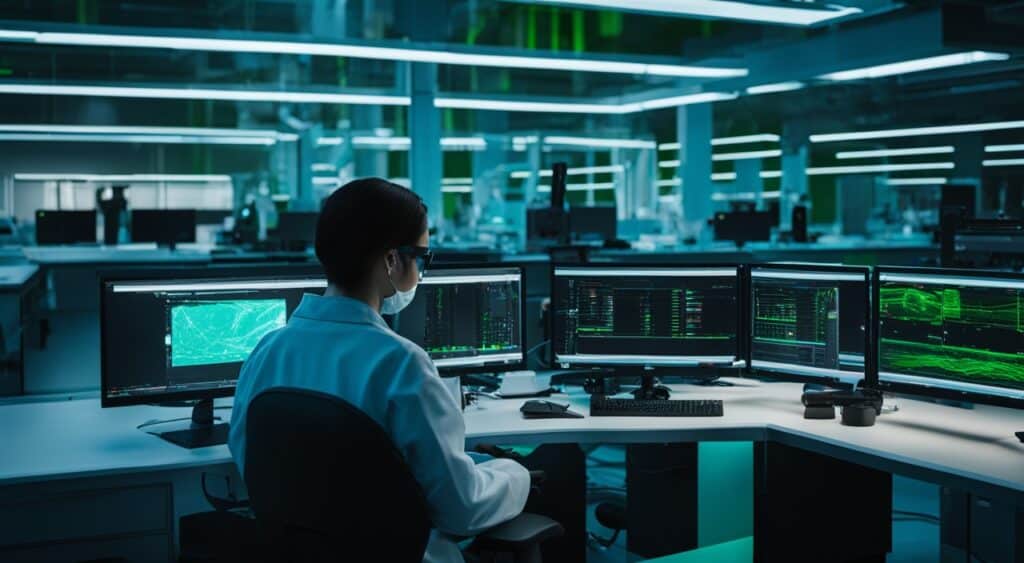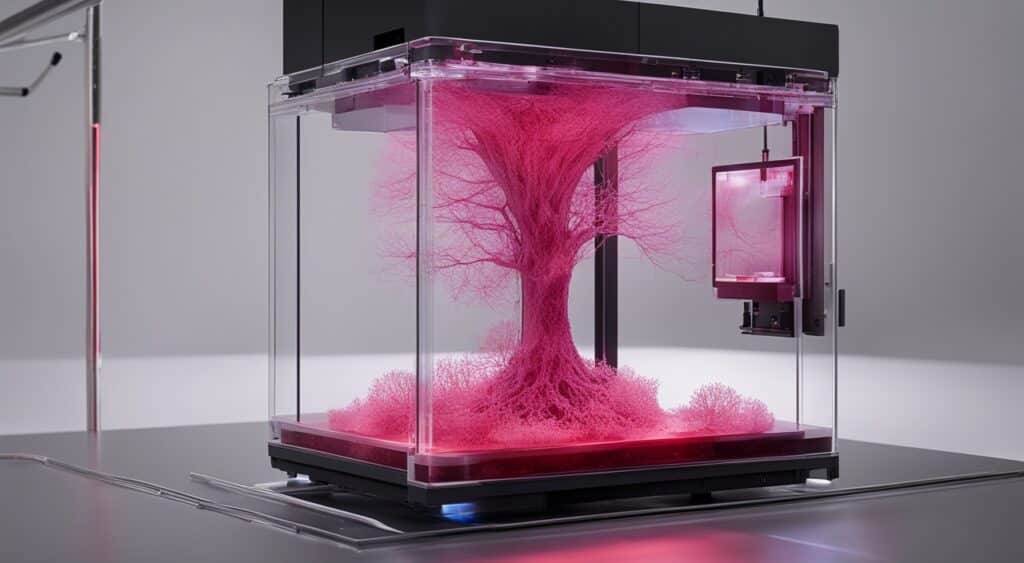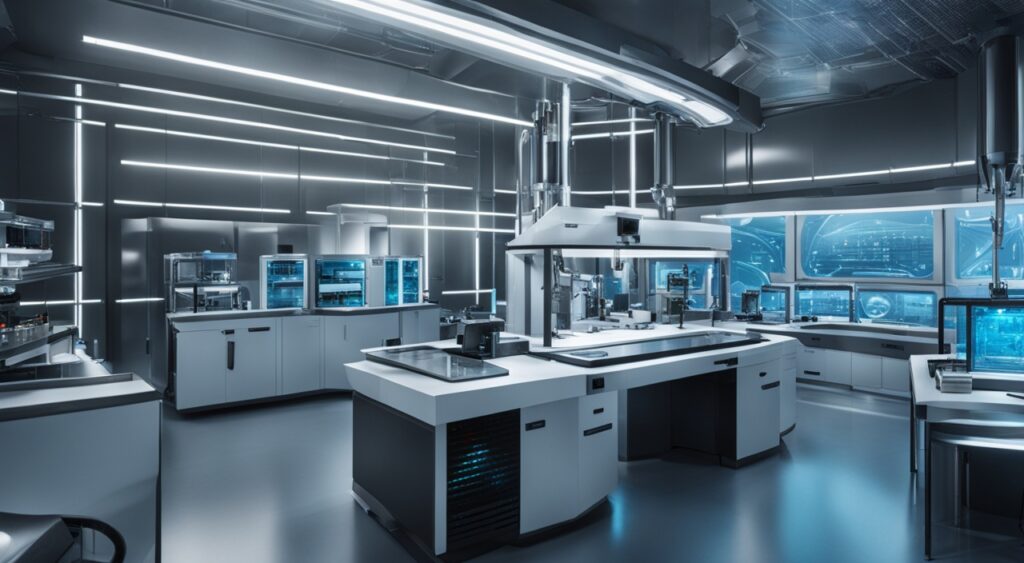Biotechnology is changing the way we think about healthcare, agriculture, and keeping our planet healthy. One area that’s seen a lot of progress recently is mRNA technology, especially after COVID-19. So, what’s next in biotech?
Key Takeaways
- Biotechnology is a rapidly evolving field with significant advancements in gene editing, precision medicine, and synthetic biology.
- Emerging trends in biotechnology include using CRISPR for gene editing and creating personalized treatments. Also, there are new ways of making biological products.
- Artificial intelligence and big data play key roles in making biotechnology research and development faster.
- It’s important for regulatory bodies and ethics to guide the use of biotechnology in a responsible way.
- The future of biotechnology is bright, promising better human health, more sustainable agriculture, and protecting our environment.
The Essence of Modern Biotechnology
Biotechnology is a key field of biology. It uses living organisms and processes for many industries. This includes fields like engineering, technology, and medicine, playing a critical role in making products.
Also Read : What Makes Life Insurance In The Usa Different From Other Countries?
Biotechnology: A Wide-Ranging Field
Biotechnology’s impact is seen everywhere, affecting numerous industries. It makes use of living things, enzymes, and biological processes. These are used to create new products and technologies for areas like pharmaceuticals, agriculture, the environment, and industry.
Also Read : Maximize Your Success With These Usa Government Job Application Strategies
Primary Areas of Modern Biotechnology
Modern biotechnology focuses on key areas such as genetic engineering and molecular biology. It includes microbial fermentation, cellular biology, gene therapy, and biosafety as well. These fields aim to advance medical, agricultural, industrial, and environmental biotechnology.
Also Read : Simple Steps To Secure University Scholarships
The biotechnology industry is constantly advancing. It promises to introduce groundbreaking innovations. These changes will improve our lives, help the environment, and move science forward.
Leading Biotech Trends Shaping the Future

The world of biotechnology is full of new ideas. These new ideas can change many areas, like healthcare, farming, and the environment. As this area grows, important trends are showing up. These trends will make big changes and set the scene for the future. Let’s look at some of the top trends in biotechnology.
Also Read : Avoid These Common Mistakes When Buying Vehicle Insurance
- Gene Editing: Gene editing, like CRISPR, allows us to change DNA very precisely. This can help treat genetic diseases, make crops stronger, and push forward in medicine and pharmacy. It opens new doors.
- Precision Medicine: Personalized medical treatments, based on our unique genes, are changing how we fight diseases. They make diagnoses more accurate, treatments more focused, and outcomes better.
- Biomanufacturing: Using biological methods in making things is making products better for the Earth. From biofuels to biodegradable items, we are creating sustainable products.
- Synthetic Biology: Making new biological systems and changing the old ones lets us create custom organisms. This helps in farming, healthcare worldwide, and making things better.
- Bioprinting: Advances in 3D printing with biomaterials are changing medicine. It’s bringing new tech for making organs, tissues, and finding new drugs.
These trends show how biotechnology can tackle big problems. It aims to better health, help with farming in a green way, and cut down on threats to our planet.
To make the best of these changes, the biotechnology field must stay ahead in innovation. It’s also key to focus on being safe and following rules closely. This way, the biotechnology field will keep moving forward. It will find ways to help people and the Earth in big ways.
Also Read : How Is Artificial Intelligence Transforming Everyday Life?
Gene Editing

Gene editing is a new way for scientists to change DNA. They can add, remove, or alter specific parts of an organism’s DNA. This tool is changing how we fight diseases and grow our food.
CRISPR: The Common Gene Editing Technique
CRISPR is a popular gene editing method. It uses a guide RNA and a Cas9 enzyme to change DNA accurately. This technique is making it easier for scientists to edit the genome of living things.
Treating Diseases Through Gene Editing
Gene editing, like CRISPR, shows a lot of promise in medicine. It could help in treating genetic diseases. These include both rare and common illnesses. By fixing the genes behind these diseases, it might stop them from ever happening.
Precision Medicine
Precision medicine is becoming more popular in the biotechnology field. It lets researchers and doctors better predict treatments and preventions for specific diseases. This method works best for groups of people. Its aim is to lower the chance of health problems in the healthcare industry. By using the latest in genetic engineering, molecular biology, and bioinformatics, precision medicine provides care designed for each person’s genetic makeup and health details.
Personalized Treatment Strategies
Developing unique treatment plans is a big part of precision medicine. Doctors study an individual’s genome, how their cells work, and other key biological data. They might find genetic traits or markers that influence disease risks or how someone reacts to treatments. With this info, they can create special therapies like gene therapy or biopharmaceuticals. These treatments work better and are safer.
Using precision medicine can really change healthcare. This approach makes medical care personalized and efficient. Thanks to biotechnology, genetic engineering, and detailed data analysis, doctors can match treatments very closely to what each patient needs. This can improve health results and lighten the diseases’ impact on people.
Biomanufacturing
Biomanufacturing is a fast-growing area of biotechnology. It uses natural processes like fermentation to make valuable things. It’s a new way that doesn’t use traditional methods, but instead uses living organisms and biological processes. It makes chemicals, materials, and other bioproducts needed in industries like pharmaceuticals and agriculture.
At its core is fermentation. This is a basic process where microorganisms like yeast or bacteria change organic substrates into something valuable. For ages, this has been used to make food, drinks, and more. Today, biotechnology uses fermentation to efficiently make biopharmaceuticals and enzymes.
Biomanufacturing leads in green and new solutions. It uses genetically engineered microorganisms and advanced bioprocessing to produce biobased items. This includes bioplastics and biofuels. It helps reduce harm to the planet and tackles tough issues like climate change. The growth of the biotechnology field means biomanufacturing will continue to bring new ideas. This will change the way many industries work, making our future more green.
Synthetic Biology
Synthetic biology is an exciting area in biotechnology. It focuses on creating new biological systems or changing old ones for good reasons. This approach is changing how we work with genetic engineering, molecular biology, and cellular engineering.
Engineering Biological Systems
Synthetic biology works by handling biological elements like DNA, proteins, and other biomolecules. These are used in selected cells for experiments. This lets scientists make new genetic circuits, pathways, and organisms for specific needs.
Applications Across Industries
Synthetic biology helps in many fields like agriculture, healthcare, and manufacturing. For instance, it’s used to create biofuels, drugs, and eco-friendly materials. Its potential to change industries is huge. And, it’s a key area of focus for biotech firms and researchers worldwide.
Bioprinting

In the world of biotechnology, bioprinting is making big waves. It’s like 3D printing, but it uses cells or biomaterials to make organ-like structures. This new way of making things is really changing how we look at bioengineering.
Also read: Exploring Artificial Intelligence Trends & Insights
3D Printing with Biomaterials
Bioprinting carefully puts together living cells, materials, and growth factors. The result is 3D structures that act like real organs. It’s a cool way to make tissues and organs that work almost like the real thing.
This technique combines the power of biotechnology and genetic engineering. It lets us make things like custom implants and even organs. These can be exactly what a patient needs.
Potential in Healthcare and Drug Discovery
Bioprinting could change everything in healthcare and making drugs. It opens up ways to make treatments special for each person and to grow new tissues. This is all really exciting for medicine.
In drug development, bioprinting creates new ways to test medications. It makes models that work a lot like the human body. Now, we can test drugs more accurately and make sure they’re safe.
Bioprinting is leading the way in biotechnology. It promises better health treatments, fixing tissues, and improving human health. The future looks bright with bioprinting.
biotechnology
Artificial intelligence (AI) is boosting many fields, including biotechnology. It’s helping biotech companies work smarter through better automation. For instance, AI can spot important markers for drug and diagnostics development.
Artificial Intelligence in Biotechnology
The blend of AI with biotech is leading to big steps forward. AI sifts through huge amounts of data, finds trends, and predicts outcomes. This speeds up finding new medicines, tailoring treatments, and creating new biotech products. Companies are using AI to improve their operations and learn more from their research.
Big Data and Biotechnology
Today, biotech creates more data than ever, from mapping genes to running tests. Big data analysis is key, helping researchers dig up new facts, spot fresh targets, and make better choices. With tools like advanced analytics and data visuals, biotech firms are making strides in precision medicine, farming tech, and green biotech.
FAQs
Q: What is biotechnology?
A: Biotechnology is the use of living organisms or biological systems to develop products and processes that benefit various industries such as pharmaceuticals, agriculture, and environmental preservation.
Q: What are some applications of biotechnology?
A: Some applications of biotechnology include agricultural biotechnology, industrial biotechnology, medical biotechnology, environmental biotechnology, and pharmaceutical biotechnology.
Q: What are genetically modified organisms (GMOs) in the context of biotechnology products?
A: Genetically modified organisms are living organisms whose genetic material has been altered using genetic engineering techniques, which is a common practice in producing biotechnology products.
Q: How do biotechnology companies contribute to advancements in the field?
A: Biotechnology companies play a crucial role in driving advancements in biotechnology by investing in research and development, conducting clinical trials, and bringing innovative products to the market.
Q: What is the significance of tissue engineering in biotechnology?
A: Tissue engineering is a field of biotechnology that focuses on creating functional human tissue for medical purposes such as organ transplants and regenerative medicine, offering potential solutions to various health challenges.
Q: What role does sequencing play in biotechnology?
A: Sequencing is the process of determining the exact order of nucleotides in a DNA molecule, which is vital in various biotechnological applications such as genetic research, personalized medicine, and understanding genetic diseases.
Q: How has industrial biotechnology impacted sectors like agriculture and manufacturing?
A: Industrial biotechnology has revolutionized sectors such as agriculture and manufacturing by introducing sustainable practices, developing bio-based products, and reducing reliance on traditional resources like fossil fuels.


